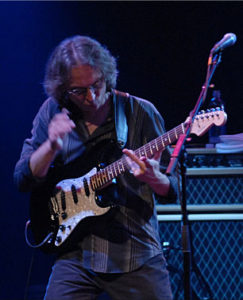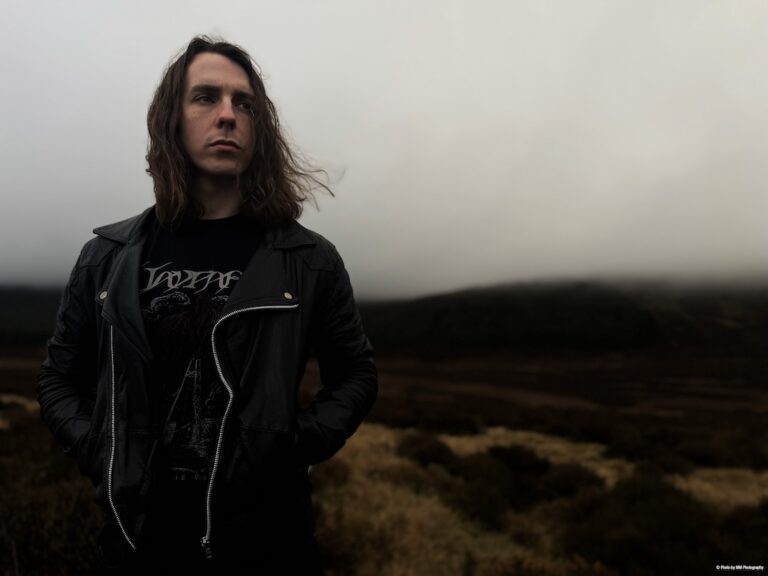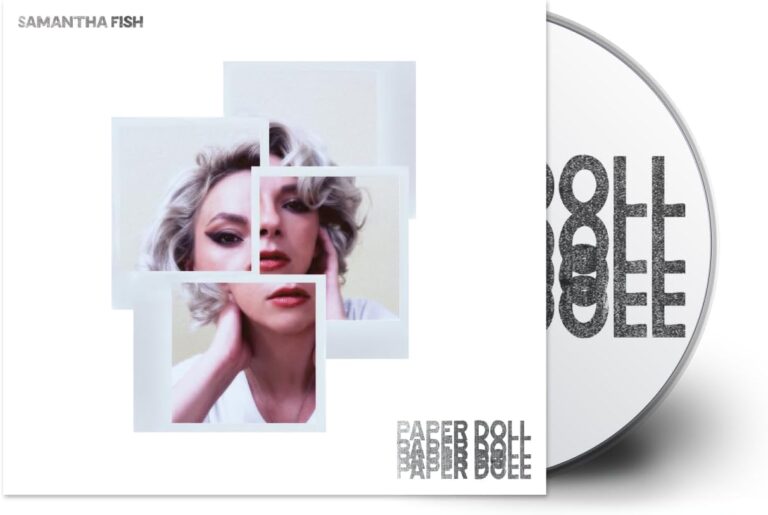Sonny Landreth is a guitar legend. His unique style of playing, nicknamed ‘slydeco’ thanks to the strong zydeco influence that runs through it, has earned him plaudits from across the guitar playing world, not least from Eric Clapton who has regularly stated his appreciation for Sonny’s exceptional talent.
However, for me, what sets Sonny apart is not his technical ability, but the emotion and passion he puts into his songs. Albums such as 2015’s ‘Bound by the blues’, a tribute to the music and musicians of the blues, and 2008’s gorgeous ‘from the reach’, showcased an artist who could make a genuine emotional connection with his fans. However, Sonny’s most recent album, the double ‘live in Lafayette’ set, is arguably one of the most personal albums he has yet recorded. Featuring an array of tracks representing his expansive back catalogue, Sonny; alongside Dave Ranson (ukulele bass), Brian Brignac (Cajon), Steve Conn (accordion) and Sam Broussard (acoustic guitar); set about reworking a selection of songs in a fresh, new style that brings the music to life in a whole new way. It was, therefore, a pleasure to speak to Sonny about how this vibrant new album came to life.
I was lucky enough to speak to you around the time of ‘Bound by the blues’ (check out the interview here) and we spoke about how, when you recorded that album, you very much wanted to pay tribute to the blues and also, that your fans had been asking for a straight up blues album from you for a long time. So, I was wondering how, now that you’ve had a chance to tour the record, you felt it had been received?
It was great man! It had a really good response from people everywhere and that’s always a nice affirmation to have. I think that that particular group of songs kind of resonated with people as well, and maybe even more than I would have thought. Also, the original songs, so I think that the tribute in that regard goes a little deeper in a personal way for the listeners as well.
One of the things that, for me, is very special about this live album that you’ve out together, is that it’s a chance to hear those songs in a very different way, particularly as you re-interpreted the title track in a way I wouldn’t have expected. How did you go through the process of reinterpreting the songs?
It was a little bit tricky because I did want to do a kind of retrospective, so there had to be songs that would span my entire career. It’s a lot of songs now, and in a way, like you say, some of those songs had a bigger production when they were played electric, and to reinterpret them was really interesting for us as well because it had a completely different dynamic. In fact, the song ‘bound by the blues’ and, I think, another one in particular, ‘Creole Angel’, I think they actually worked better acoustic.
It’s always better live anyway because you have the audience, the energy and you’re in the heat of the moment. But still, I felt that we probably pooled the best that was to be had of the live environment with that approach to the songs. Some of them were a given. For example in the electric set, I knew I wanted to get some of those instrumentals just like we did them every night as a three-piece band, like ‘brave new girl’, and I knew with Steve Conn on keys and Sam Broussard on guitar, that they’d be playing great solos and great rhythm parts and that would fill out and create a greater sound for… well, ‘walkin’ blues’ was one song we did on that album, so that came off very different. Then there’s that staple which is typical of an encore song which is ‘Back to Bayou Teche’, so we came out firing on the last night and did it first, just to shake it up. I had three nights to record, so the idea was to take the best of that, so that’s pretty much what we did.
I’m glad you mentioned ‘back to Bayou Teche’, because that song particularly… the live version you have reminds me of those classic Neil Young albums where the song gets extended out and it sounds like you were jamming on that song, or that take of it at least.
Oh yeah, I usually do that with the trio every night, we just take off at the end and I never know what’s going to come out! There are certain themes, and that’s a good way to do it – you have a theme for the song and you improvise and then come back to that theme and tie it together, hopefully in a way that builds. But this way, everybody gets to play and I didn’t go off too far in the extension at the end, so that it stayed more thematic that way. Yeah, that was big fun. Having those guys on board was just so great and I go way, way back with all of them, but we’ve never actually done a project together, just the three of us, so I was really keen on doing that and there was magic with those guys and I was in good hands all around.
One of the things, particularly about the acoustic set with the accordion on there, was there was this kind of fresh, European breeze running across the songs which I hadn’t expected but which fit really well…
Well yeah, you’re actually right, There’s a direct line from the culture here in South Louisiana to Europe and the accordion is a big deal for Cajun music, there’s a Germanic influence, an Italian influence and that became incorporated in the Cajun folk songs a long time ago and it’s standard procedure now. Steve plays a different kind of accordion than a lot of the Cajuns around here and he’s so prolific and so universal that he can play anything. I think that particular type of accordion combination with the resonator guitar I play, and that’s a metal bodied guitar, right, and then Sam Broussard’s Martin, which is a vintage, parlour acoustic, that was a really cool combination and also, our drummer, in lieu of a drum set, he played the Cajon which is a Latin percussion instrument which he sits on, it’s like a box, it’s really cool man, he hits one side with the flat of his hand and one side is kind of a kick drum sound and the other side he cracks like a snare because it has a snare built in side and what that does, is it creates a whole lot of space in the top end and it gives everything such a big open sound. Then Dave, our bass player, played the ukulele bass which has such a cool sound. He brought that to the studio for ‘bound by the blues’ and I fell in love with that thing. We used it on four tracks, I think, on the last album, and that kind of inspired this whole thing. That was the foundation and then we just expanded the acoustic thing from there and it really worked out great. It’s a fresh new sound in a way. There are a lot of old ingredients in a new way, and I like that.
That feeds through into a song that I know is very important to you which is ‘Key to the highway’, you covered it on ‘Bound by the blues’ and it comes really to life on this live album – that’s a song with a lot of meaning to you personally I think?
Yeah, and like we said before, some of those old blues tunes are the ones I grew up with and the earliest songs I learned to play and I mean, it’s just… I don’t know what to say, those songs, they still surprise me. I guess the fact that, as I evolve and keep bringing in new ideas and techniques that I’ve developed, those songs kind of give it back. They adapt to all of that and, in this case, with the acoustic version, I think… when you break it down like that, in a way it’s more powerful. There’s a subtlety there that comes across better in the verses, singing, my voice…
The whole thing comes across really well and one of the things that I know that people here in the UK will be very interested about is if there’s any possibility of your bringing this show over here at any point?
Oh absolutely! Absolutely. We’re talking about a show in September. We played at Under the Bridge last in London and so we’ll see and at this point I’m sure we will regardless. We’re doing the acoustic thing as well, and that’s kind of set the stage as it were for this concept where we come out, do an acoustic set, take a short break and then return and amp it up. We’ve got two backlines so to speak, instead of the acoustics in front of the electric amps and the full drum kind of thing, and it’s been very selective. It was great to go out on the road prior to the recording because we wanted to build up a head of steam and work things out. It gave us a chance to find out what works and what didn’t. And that, probably more than anything, helped us to get the pacing of those songs and which ones worked – which you were asking about earlier. So, we’re out doing it still for the rest of the year and, I’m sure, into the next year. I’m kinda hooked on it now. It’s a challenge for me because it’s a completely different approach in a way to do it acoustic rather than electric, but I’ve always loved it and there was a point in time when that was all I did for two years. The early seventies I didn’t play electric guitar for two years and I’m kinda coming back to that vibe. I can’t say that I have the chops that I did back then, but I’m working on it!
One of the things which we spoke about last time was that temptation to get lost in the technology that comes with being a guitarist, vintage amps and fx units, particularly those vintage tape loops and stuff, there’s something so different about playing acoustic – there’s nothing to fall back upon and it becomes all about the playing…
Right, exactly. You know, a lot of the song writers will tell you the same thing. You’ll hear the big, loud production with all the instrumentation and production and the whole thing, but they started that song out in their living room on an acoustic guitar, when they started writing the song. So, there’s that bare bones feel and I think in a way… a good song can be interpreted any number of ways, but by stripping down like that you get to the truthful element of it I would say, and I think that’s why people respond so well to it.
One last question for you, you’ve said you’ve been very inspired by going out on the road with these musicians, is that feeding into a new album?
Well, I’m always up for that! It’s good to hit the ground running. It’s a little early to tell now. I’ve got some songs I’ve been working on for a while and I always have new ideas, but it is interesting how, for example, doing this acoustic thing has created ideas for other songs we haven’t played yet. Actually, that’s how we ended up having one disc all acoustic and one disc all electric in the package for the CD, and also vinyl by the way, it’s a double vinyl – very cool… so in order to have enough songs to do that we had to come up with a last track… we were shy maybe one song and Dave, the bass player, said “how about ‘Zydecoldsmobile’?”, so we did that the last night. It’s the only time we’ve ever done that, it’s the only performance from the three nights, so I think there’s more of that to come. We’ll see what happens.
I’m really excited about the vinyl particularly because I’m a terrible vinyl nut…
You know what, we had that mastered specifically for vinyl. We didn’t just take the digital masters like a lot of people do and just send it to the plant and let them deal with it. There’s too much information that hits the needle when they cut the lacquers. So we did a separate master, so it should sound really great [it does – Ed.]… I haven’t even heard it yet.





